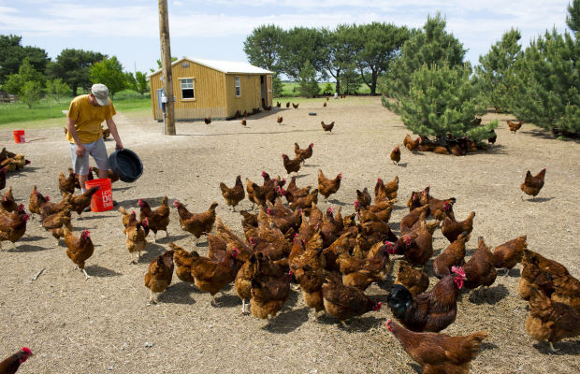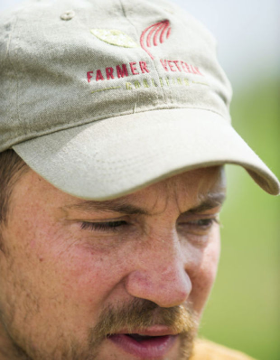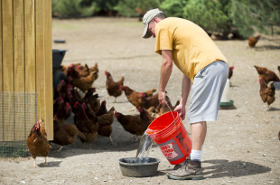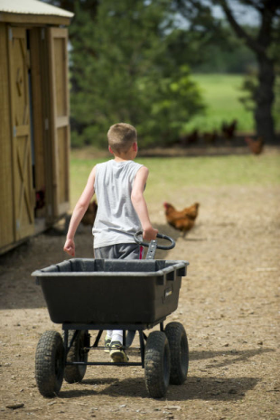
YORK — Dan Hromas reached down and ruffled the rust-colored tail feathers of a chicken.
The Rhode Island Red squatted briefly, then shook and strutted away with a cluck. Hromas smiled and laughed.
“They’re a great dual purpose breed. They’re excellent egg layers, and when they’re done, I can sell them as stewing hens,” the Iraq War veteran said.
After nearly two decades protecting U.S. freedom and interests as a soldier, the former Marine and current member of the Nebraska Army National Guard has found new purpose and resolve through his flock of 600 chickens.
He is among a small but growing group of Iraq and Afghanistan veterans now feeding the nation they served as a member of the armed forces.
Hromas’ York-area farm, Prairie Pride Poultry, is the first in Nebraska and second in the United States to be certified by the new national program Homegrown by Heroes, a marketing initiative that recognizes farmer veterans.
***

For Hromas, the birds are both livelihood and therapy.
“Boredom is the most hazardous thing to my health,” said the chicken farmer who returned from a yearlong deployment to Iraq just in time for Christmas 2007 with persistent ringing in his ears and post-traumatic stress disorder.
Before that, Hromas was a graduate student at the University of Nebraska-Lincoln studying microbiology on an Army ROTC scholarship. That came to an end when he was activated in advance of his National Guard unit on July 31, 2006, as part of President George W. Bush’s surge of American forces.
When he returned to Nebraska, Hromas got a commercial driver’s license but had difficulty sticking with a job. The one he kept for more than a year was driving a truck for the United Farmer’s Co-op in Utica.
“I can’t put up with a lot of s***,” he said.
***

All soldiers leave the military different than they went in, said Don Sandman, a Vietnam veteran and Veterans’ Service Officer in York County.
“That is just the way it is,” Sandman said. “The military itself is traumatic. You’re in there for one reason and one reason alone. And that is to be prepared to kill mankind.”
Many veterans struggle with hearing problems, depression and the effects of PTSD. The Veterans Administration says 22 of them kill themselves every day.
The military instills a sense of being part of a greater good, part of something bigger than any individual.
That sense of duty and fellowship doesn’t come with punching a clock, said Chet Bennetts of the Farmer Veterans Coalition.
Farming can give veterans a sense of purpose again, he said.
The Farmer Veteran Coalition, which is based in Davis, California, has helped about 2,400 military service members, some still active, get involved in farming nationwide. In Nebraska, there are 35 veterans on the coalition’s radar.
“Being able to work hard and have something to do every day and feel good about it is way better than just punching a clock and getting by,” said Bennetts, who works from Lincoln.
Forty-six percent of U.S. military members hail from rural settings and many will return to them, said Scott Mickelsen, associate dean with the University of Nebraska’s College of Technical Agriculture.
“It can be somewhat soothing for them to work with animals, to work with plants, to work outdoors in a little less stressful situation,” he said.
The work ethic drilled into soldiers transfers well to agriculture, Mickelsen said. The college has developed a program tailored to retired military called Combat Boots to Cowboy Boots, which attracts four to seven veterans a year.
***

Hromas liked working for the United Farmers Co-op, but it was just a job. He started thinking about summer trips to visit his grandparents’ farm in North Dakota, looking for the eggs the chickens that ranged free laid in straw bales.
“It was like an Easter egg hunt every day.”
He missed that and wanted his four kids to have the same experience. Plus, he likes to eat eggs, and he likes the idea of being his own boss.
In October 2012, Hromas took his first step toward becoming a farmer and signed up for a Farm Beginnings Nebraska program hosted by the Nebraska Sustainable Agriculture Society. He networked, took more classes, wrote a business plan, applied for grants and joined the York Chamber of Commerce.
On May 31, 2013, he incorporated his business and three months later got his first 300 birds. He sold his first dozen eggs to a man at the local Eagle’s Club. His first commercial account was with Chances R Restaurant in York, which buys his eggs for Sunday brunch.
Today, his hens produce 3,150 eggs a week. He sells them to Grand Central Foods in York, the Hy-Vee in Grand Island and as of last week the Williamsburg Hy-Vee in Lincoln.
Once a month, he sets up a booth at the Old Cheney Road Farmers Market and last Sunday sold out of 62 dozen eggs in three hours.
His eggs cost a little more than the generic white ones at supermarkets, Hromas said, but people are willing to pay it because they know the eggs are fresh and were laid just down the road. He prefers the term “pasture-raised chickens” to the more ambiguous descriptors “cage free” and “free range.”
His main selling points are local, healthy eggs produced by happy chickens. When he has extra eggs, he donates them to local food banks and soup kitchens.
His chickens sleep and lay eggs in coops but spend their days roaming three acres he rents just northeast of York. He likes the peace of the farm and how it keeps him too busy to dwell on the past.
A person can get frustrated and throw a wrench, Hromas said. It’s not so easy to throw a chicken.
***

Hromas said he doesn’t like using his status as a veteran for personal gain but decided to use the Homegrown by Heroes label to reach out to fellow veterans, to let them know they’re not alone and help is available.
The program was started by the Kentucky Department of Agriculture and recently went national through the work of the Farmer Veteran Coalition with underwriting from the Farm Credit Network, a group of borrower-owned lending institutions.
“I got to thinking if I have that label on the product, people are going to start asking questions,” Hromas said. “That will open the door for me to start talking about the Farmer Veteran Coalition, about agriculture.
“Veterans in general, especially veterans with disabilities, can have a future in agriculture if they want.”
Originally published in the Lincoln Journal Star on Sunday, May 29, 2014. Story by Nicholas Bergin.
